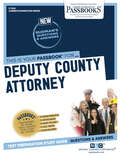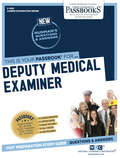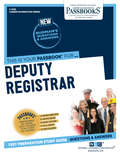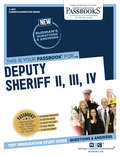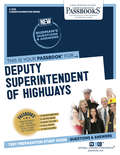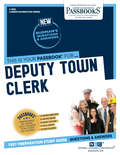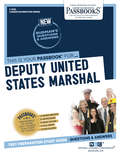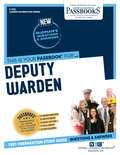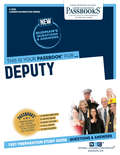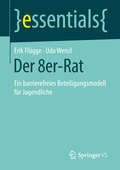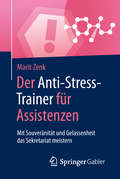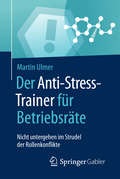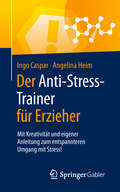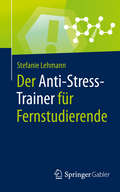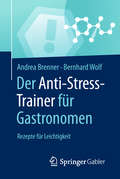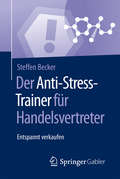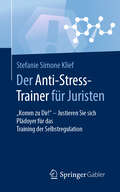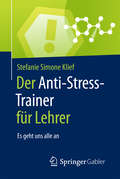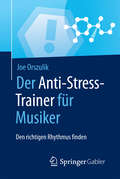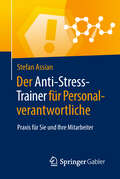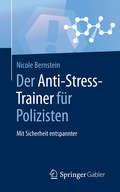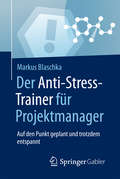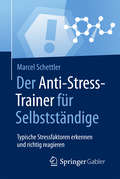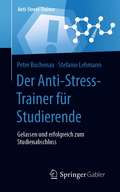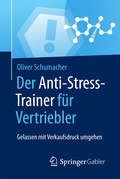- Table View
- List View
Deputy County Attorney: Passbooks Study Guide (Career Examination Series)
by National Learning CorporationThe Deputy County Attorney Passbook® prepares you for your test by allowing you to take practice exams in the subjects you need to study. It provides hundreds of questions and answers in the areas that will likely be covered on your upcoming exam, including but not limited to: legal principles; legal aptitude; legal reading comprehension; legal terminology; and more.
Deputy Medical Examiner: Passbooks Study Guide (Career Examination Series)
by National Learning CorporationThe Deputy Medical Examiner Passbook® prepares you for your test by allowing you to take practice exams in the subjects you need to study. It provides hundreds of questions and answers in the areas that will likely be covered on your upcoming exam.
Deputy Registrar: Passbooks Study Guide (Career Examination Series)
by National Learning CorporationThe Deputy Registrar Passbook® prepares you for your test by allowing you to take practice exams in the subjects you need to study. It provides hundreds of questions and answers in the areas that will likely be covered on your upcoming exam.
Deputy Sheriff II, III, IV: Passbooks Study Guide (Career Examination Series)
by National Learning CorporationThe Deputy Sheriff II, III, IV Passbook® prepares you for your test by allowing you to take practice exams in the subjects you need to study. It provides hundreds of questions and answers in the areas that will likely be covered on your upcoming exam, including but not limited to: educating and interacting with the public; state law and investigative techniques; preparing written material; supervision; service and enforcement of civil and family court processes; and more.
Deputy Superintendent of Highways: Passbooks Study Guide (Career Examination Series #C-2319)
by National Learning CorporationThe Deputy Superintendent of Highways Passbook® prepares you for your test by allowing you to take practice exams in the subjects you need to study. It provides hundreds of questions and answers in the areas that will likely be covered on your upcoming exam, including but not limited to: Administrative supervision; Methods and materials of road reconstruction; Street maintenance, reconstruction and repair, including sidewalks and curbs; Occupational, environmental, public, traffic control and work zone safety practices; and more.
Deputy Town Clerk: Passbooks Study Guide (Career Examination Series)
by National Learning CorporationThe Deputy Town Clerk Passbook® prepares you for your test by allowing you to take practice exams in the subjects you need to study. It provides hundreds of questions and answers in the areas that will likely be covered on your upcoming exam.
Deputy United States Marshal: Passbooks Study Guide (Career Examination Series)
by National Learning CorporationThe Deputy United States Marshal Passbook® prepares you for your test by allowing you to take practice exams in the subjects you need to study. It provides hundreds of questions and answers in the areas that will likely be covered on your upcoming exam.
Deputy Warden: Passbooks Study Guide (Career Examination Series)
by National Learning CorporationThe Deputy Warden Passbook® prepares you for your test by allowing you to take practice exams in the subjects you need to study. It provides hundreds of questions and answers in the areas that will likely be covered on your upcoming exam.
Deputy: Passbooks Study Guide (Career Examination Series #C-204)
by National Learning CorporationThe Deputy Passbook® prepares you for your test by allowing you to take practice exams in the subjects you need to study. It provides hundreds of questions and answers in the areas that will likely be covered on your upcoming exam, including but not limited to: administration; administrative supervision; knowledge of laws, rules and regulations; word meaning; understanding and interpreting written material; preparing written material; and other related areas.
Der 8er-Rat: Ein barrierefreies Beteiligungsmodell für Jugendliche (essentials)
by Erik Flügge Udo WenzlDieses essential stellt den 8er-Rat als ein neues Modell der Jugendbeteiligung über soziale Schichten und Bildungsgrenzen hinweg strukturiert und in Form einer Praxisanleitung vor. Seit drei Jahren existieren die ersten Modellversuche des 8er-Rats in der Praxis, der hiermit einem breiteren Publikum in der praktischen Arbeit mit Kindern und Jugendlichen in den Kommunen zugänglich gemacht wird. Im 8er-Rat werden die Stärken dreier Systeme in der Kommune miteinander verbunden: Stadtverwaltung, kommunale Jugendarbeit und Schulen arbeiten in enger Abstimmung zusammen und erkennen dabei jeweils die Stärke des anderen an.
Der Anti-Stress-Trainer für Assistenzen
by Peter Buchenau Marit ZenkDieses Buch aus der Anti-Stress-Trainer Reihe ist die Erlösung für gestresste Assistenzen, die im Drehkreuz Sekretariat mit zig Bällen jonglieren. Spüren Sie den Druck, dem Sie unterliegen? Sei perfekt, sei stark, sei nett, sei schnell oder streng dich an - welcher Antreiber steckt in Ihnen? Zu Zeiten von 4.0 braucht selbst die modernste und versierteste Assistenz eine gute Strategie, um in der digital-verrückten Welt zu bestehen. Und zwar gesund! Lassen Sie sich Ihrer Illusionen „Jemals fertig zu werden“ und „Alles muss perfekt sein“ berauben. Neben dem erklärten Dilemma der Assistenz gibt es viele wertvolle Tipps zum Umgang mit Stress. Gepaart mit amüsanten Bildern, Sprüchen und Weisheiten bringt die Autorin Sie sicher zum Schmunzeln! Lassen Sie sich von Marit Zenk mit auf die Reise in Ihre Welt nehmen.
Der Anti-Stress-Trainer für Betriebsräte
by Peter Buchenau Martin UlmerDieses Buch aus der Anti-Stress-Trainer-Reihe beschäftigt sich mit den spezifischen Stressfaktoren im Arbeitsalltag von Betriebsräten und deren effizienter Bewältigung. Betriebsräte sind als Vermittler zwischen Arbeitgeber und Arbeitnehmer einer Vielzahl von Rollenkonflikten ausgesetzt. Auch die hohe Erwartungshaltung an ihr fachliches wie therapeutisches Know-how führt zu einem hohen Stresslevel. In diesem Buch lernen sie, wie sie diese Anforderungen erfolgreich zu managen, indem sie ihre eigene innere Balance bewahren. Der Autor geht gezielt auf die wichtigen Bereiche Stressprävention und Stressbewältigung ein und bietet einen informativen Überblick zum Thema Stress bei Betriebsräten.
Der Anti-Stress-Trainer für Erzieher: Mit Kreativität und eigener Anleitung zum entspannteren Umgang mit Stress! (Anti-Stress-Trainer)
by Ingo Caspar Angelina HeimDieses Buch aus der Anti-Stress-Trainer-Reihe beschäftigt sich mit den typischen Stressfaktoren bei Erzieherinnen und Erziehern und wie souverän mit diesen umgegangen werden kann. Der Arbeitsalltag von Erziehern hat sich in den letzten Jahren stark gewandelt und ist noch komplexer geworden. Fehlende Anerkennung, eine geringe Bezahlung, ein hoher Lärmpegel im Arbeitsalltag, aber auch die gestiegenen Erwartungen einiger Eltern sind nur einige der großen Herausforderungen dieses Berufes. Dieses Buch hilft Erziehern dabei, ihre persönlichen Stresssituationen im Berufsalltag zu erkennen und erfolgreich zu meistern. Die Autoren geben dafür ihre wertvollen eigenen Erfahrungen aus dem Erzieher-Arbeitsalltag und der Beratung für den sozialen Sektor im Bereich professioneller Umgang mit Stress weiter. Dabei geben sie viele nützliche Praxistipps, die leicht in den Alltag integriert werden können und Sie so den schönen Beruf des Erziehers trotz Stress wieder genießen lassen.
Der Anti-Stress-Trainer für Fernstudierende (Anti-Stress-Trainer)
by Stefanie LehmannSie möchten erfrischend anders fernstudieren und mehr erreichen als „nur“ den Bachelor-Hut? Die Autorin dieses Buches stellt einen ganzheitlichen Ansatz für ein erfolgreiches und frustfreies Fernstudium vor. Leserinnen und Leser erhalten kreative Anregungen, die helfen, eigene Lernstrategien zu entwickeln und intrinsisch motiviert zu lernen. Neben hilfreichen Tipps zu Zeit- und Selbstmanagement macht das Buch auf Ablenkungsgefahren im Alltag aufmerksam zeigt mögliche Wege auf, Job, Familie, Hobbys, Fernstudium und Zeit für sich selbst unter einen Hut zu bringen. Somit können Sie stringent durchoptimierte 24-Stunden Tage hinter sich lassen und ein entspanntes und erfüllendes Fernstudium erleben.
Der Anti-Stress-Trainer für Gastronomen: Rezepte für Leichtigkeit
by Peter Buchenau Andrea Brenner Bernhard WolfDieses Buch aus der Anti-Stress-Trainer-Reihe wurde von Gastronomen für Gastronomen geschrieben. Die beiden Autoren haben selbst in einem kleinen Familienbetrieb den stressigen Alltag hautnah erlebt. Mit allen Facetten der zwischenmenschlichen Beziehungen im eigenen Team und mit den Gästen entpuppen sich viele alltägliche Situationen als Stressbringer. Leider bleibt oft keine Zeit, sich schon an der Wurzel darum zu kümmern und zu erkunden wie und wo der Stress entsteht. Erst bei Eskalationen einzugreifen, ist sehr zeitaufwendig und meist ist das Kind schon in den Brunnen gefallen. Dieser Ratgeber gibt dem Leser aus der Branche mit vielen Beispielen und Abhilfetipps einfache und pragmatische Lösungen an die Hand . Nicht alle auf einmal, sondern wohldosiert je nach Zeit und Möglichkeiten, können Gastronomen kapitelweise lesen und ausprobieren. Die Autoren erzählen eigene Geschichten sowie Erfahrungen und welche Methoden sie als Gastronomen und Coaches angewendet haben, um Stresssituationen zu erkennen und für die Zukunft zu verringern. Immer geschrieben mit einem für die Branche üblichen Augenzwinkern und einer Portion Selbstironie.
Der Anti-Stress-Trainer für Handelsvertreter
by Peter Buchenau Steffen BeckerDieses Buch aus der Anti-Stress-Trainer-Reihe ist auf die Berufsgruppe der Handelsvertreter zugeschnitten. Ein hohes Arbeitspensum sowie Termin- und Erfolgsdruck und der Umgang mit schwierigen Kunden sind nur einige der Stressoren. Der Tätigkeitsbereich hat sich gewandelt und dennoch ist eines gleichgeblieben: Der Handelsvertreter steht im Spannungsfeld zwischen den Bedürfnissen der zu vertretenden Firmen, der Kunden und seiner eigenen. Diesem Spannungsfeld gerecht zu werden, ohne sich selbst aus den Augen zu verlieren, ist ein Balanceakt, der täglich neu gemeistert werden muss. Dieses Buch kann dem Leser wichtige Hilfestellungen bieten. Der Autor geht auf die unterschiedlichen Anforderungen von den zu vertretenden Unternehmen, der Kunden, der Familien und Freunde ein und zeigt dem Leser Wege auf, wie er den Arbeitsalltag selbstbestimmt und ausgeglichen meistern kann, ohne in die Stressfalle zu geraten.
Der Anti-Stress-Trainer für Juristen: "Komm zu Dir!" - Justieren Sie sich Plädoyer für das Training der Selbstregulation (Anti-Stress-Trainer)
by Stefanie Simone KliefJuristen bilden keine heterogene Berufsgruppe ab. Sie nehmen die unterschiedlichsten Tätigkeiten wahr, sind in den verschiedensten Hierarchien eingeordnet und arbeiten sich gleichermaßen durch Aktenberge wie direkt „am Menschen“. Da geht es um Rechtsgestaltung, Streitvermeidung und Streitentscheidung, also Urteilskraft. Dazu braucht es Problemlösungs- und Analysefähigkeiten. Das ist es, was alle eint: vor oft schwierig fassbaren Problemen nicht zu kapitulieren, sondern selbstgesteuert Rückschlüsse zu ziehen und konstruktive Lösungsmöglichkeiten zu erarbeiten. Diese Fähigkeiten nutzt der Anti-Stress-Trainer für Juristen als Grundlage, um darauf aufbauend das Bewusstsein für die Ressource der Selbstregulation zu wecken und sie mittels einiger Techniken zu trainieren. Dies braucht Zeit, Raum und Engagement. Jegliche Prozesse, und gerade die der Stressregulierung, können dauerhaft nur über Bewegung zum Ziel führen. Zu dieser facettenreichen Dynamik möchte das Buch gerne anregen.
Der Anti-Stress-Trainer für Lehrer
by Peter Buchenau Stefanie Simone KliefDieses Buch aus der Anti-Stress-Trainer-Reihe stellt das Thema Stress bei Lehrern in den Fokus. Lehrerinnen und Lehrer sind im Berufsalltag mit vielen Herausforderungen konfrontiert: schwierige Schüler, ein ständiger Lärmpegel, das Thema Mobbing und nicht zuletzt anstrengende Eltern und ein geringes gesellschaftliches Prestige können im Lehreralltag eine belastende Rolle spielen. All diese Stressfaktoren führen dazu, dass Burnout bei Lehrern immer häufiger auftritt. Doch es gibt Möglichkeiten diesem Stress frühzeitig und effizient entgegenzutreten. Dieses Buch zeigt solche Möglichkeiten in kompakter Form auf, indem es den Leser dabei unterstützt seine eigenen Belastungen zu identifizieren und erfolgreiche Strategien gegen Stress zu entwickeln. Ein sinnvolles und vor allem hilfreiches Buch für mehr Ausgeglichenheit im Lehreralltag.
Der Anti-Stress-Trainer für Musiker
by Peter Buchenau Joe OrszulikDieses Buch aus der Anti-Stress-Trainer-Reihe thematisiert das Leben und die Stressfaktoren von Musikerinnen und Musikerin. Zahllose Musiker, Instrumentallehrer, Musikpädagogen, Komponisten und auch Textschreiber, die allermeist sehr euphorisch in ihre Karriere starten, sind schon bald desillusioniert, erschöpft oder leiden sogar unter Burnout. Gründe dafür sind unter anderem eine unsichere finanzielle Position, unregelmäßige Arbeitszeiten und auch eine starke körperliche Belastung. Dieses Buch informiert die Leser nicht nur über das Thema Stress bei Musikern, sondern gibt gleichzeitig viele hilfreiche Praxistipps für einen gesunden und erfolgreichen Umgang mit Stress. Der Autor, der selbst jahrelang aktiver Musiker war, gibt seine Erfahrungen und sein Wissen in diesem Buch weiter.
Der Anti-Stress-Trainer für Personalverantwortliche: Praxis für Sie und Ihre Mitarbeiter (Anti-Stress-Trainer)
by Peter Buchenau Stefan AssianDieses Buch aus der Anti-Stress-Trainer-Reihe führt zur Mitte: Ins Zentrum des Stresses der Personalverantwortlichen und in den Raum ihres Selbst.Im Kontext der vorherrschenden Dynamik und Hektik unserer Zeit, die gerade die Personalabteilungen erfasst hat, widmet es dem alten Wissen eine besondere Aufmerksamkeit.Dessen Darstellung, eingebettet in gegenwärtige unternehmerische Strukturen, macht deutlich, dass seine Prinzipien heute aktueller denn je sind.Durch die technischen Veränderungen haben sich das Leben und die Probleme des Menschen in der Welt geändert aber die wesentlichen Fragen sind dieselben geblieben.Anhand des „Fünf Ebenen Modells“ mit seinen Wurzeln in uralten Traditionen und der Jahrtausende alten chinesischen Lehre von den „Fünf Elementen“ bietet dieser Ratgeber Hilfe zur Selbsthilfe, die in der modernen Unternehmenswelt praktisch angewendet werden kann.
Der Anti-Stress-Trainer für Polizisten: Mit Sicherheit entspannter (Anti-Stress-Trainer)
by Nicole BernsteinIm vorliegenden Anti-Stress-Trainer sollen Stressoren aus unterschiedlichen Tätigkeitsbereichen der Polizei – ohne Anspruch auf Vollzähligkeit – anhand von Beispielen dargestellt und Tipps zur Stressbewältigung gegeben werden. Beleuchtet werden von möglichen Laufbahnwechseln über die Vereinbarkeit des Berufs mit der Familie und die Einflüsse auf das Privatleben bis hin zu gefährlichen oder traumatisierenden Einsätzen ganz verschiedene Bereiche. Soziale Netzwerke und Messenger sind heute omnipräsent und haben somit als eigener Einflussfaktor ebenfalls Eingang in dieses Buch gefunden.Das Werk richtet sich an alle dienstlichen Ebenen der Polizei und soll auch gleichzeitig für BewerberInnen eine Entscheidungshilfe sein, sich für diesen Beruf im Sinne einer Berufung zu entscheiden.
Der Anti-Stress-Trainer für Projektmanager: Auf den Punkt geplant und trotzdem entspannt
by Markus BlaschkaDieses Buch aus der Anti-Stress-Trainer-Reihe befasst sich eingehend mit dem inoffiziell größten Berufsrisiko von Projektmanagern, dem Stress. Nicht einmal ihr Privatleben bleibt von der Vielzahl von Stressfaktoren, denen sie sich gegenüber sehen, verschont. Projekte müssen nicht nur kompetent, sondern bei ungeduldigen Auftraggebern auch möglichst schnell abgewickelt werden. Erschwerend dazu können Präsentationsdruck, ein entscheidungsschwacher Vorstand, ein enges Budget und im schlimmsten Fall auch noch Kleinkrieg im Team hinzukommen. Aber all dies muss nicht sein, denn dieses Buch hilft Ihnen dabei, Ihren beruflichen und privaten Stress erfolgreich und effizient zu meistern und macht nebenbei auch noch Spaß beim Lesen. Die Leser erhalten Informationen aus erster Hand, da der Autor aufgrund seiner weitreichenden Erfahrung im Bereich von IT- und Beratungsprojekten Experte für das Thema Projektmanagement ist. Die ReiheStress gehört in unserem Berufs- und Privatleben zum Alltag. Dabei unterscheiden sich die stressauslösenden Faktoren jedoch je nach Berufsgruppe. Aus diesem Grunde widmen sich in der Anti-Stress-Trainer-Reihe, initiiert von Peter Buchenau, führende Expertinnen und Experten diesen spezifischen Stresssituationen.Der AutorDr. Markus Blaschka ist Business Coach, Management Trainer und Senior Consultant. Er coacht Projektleiter und entwickelt maßgeschneiderte Projektmanagement-Konzepte für Betriebe. Besonders beschäftigt er sich mit der Frage, wie Projekte stressfrei und ohne die üblichen zwischenmenschlichen Konflikte erfolgreich durchgeführt werden können.
Der Anti-Stress-Trainer für Selbstständige
by Peter Buchenau Marcel SchettlerDieses Buch aus der Anti-Stress-Trainer-Reihe widmet sich dem Thema Stressbewältigung für Selbstständige. Oft fehlt selbständigen Unternehmern ein neutraler ebenbürtiger Gesprächspartner, um berufliche Themen zu diskutieren. Das Ergebnis, wenn Selbstständige alles mit sich alleine abmachen: Stress pur. Doch das ist nur ein Aspekt von vielen, der Unternehmer in Stress und Überforderung führt. Der Anti-Stress-Trainer für Selbständige zeigt Ihnen die typischen Stolpersteine auf, die Sie geradewegs in die Stressfalle führen und hilft Ihnen mit praktischen Tipps, diese Stolpersteine zu umgehen. Zudem öffnen gestandene Unternehmer ihre persönliche „Anti-Stress-Trickkiste“ und verraten Ihnen neben ihrem eigenen stressigsten Erlebnis ihren persönlichen Praxistipp gegen Stress und Überlastung.
Der Anti-Stress-Trainer für Studierende: Gelassen und erfolgreich zum Studienabschluss (Anti-Stress-Trainer)
by Peter Buchenau Stefanie LehmannEin Studium ist oft mit Stress verbunden, gerade vor Klausuren, Hausarbeiten und mit Blick auf die Thesis. Auf der einen Seite werden Lernanforderungen immer komplexer, auf der anderen Seite arbeiten viele Studierende nebenbei. Der AST für Studierende gibt Tipps, wie junge Studierende gelassener ihr Studienziel erreichen. Dazu wurden über die letzten fünf Jahre aktive Studierende verschiedener Hochschulen zu ihren best practices befragt.
Der Anti-Stress-Trainer für Vertriebler
by Peter Buchenau Oliver SchumacherDieses Buch aus der Anti-Stress-Trainer-Reihe beschäftigt sich umfassend mit dem Thema Stress bei Vertrieblern. Es dient als Ratgeber für alle Vertriebler, die unter Akquise- und Verkaufsdruck stehen, permanent auf der Straße unterwegs sind und/oder unter Zeitdruck und Dauerhochleistungen agieren. Konkrete und im Alltag anwendbare Anti-Stress-Tipps und Beispiele machen dieses Buch sehr praxisorientiert.
